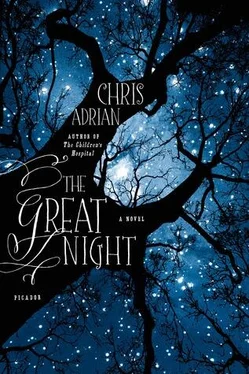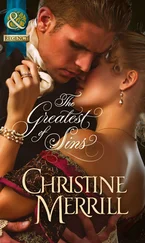He looked back at the park. A stiff wind was blowing down the hill, and as he thought of going in to look for the dog it gusted all of a sudden, strong enough to push him down a step and cold enough to draw his attention to the fact that he was wearing pajamas that were far too small for him. He thought of the dog, of the tears as round and rolly as marbles coursing down his snout, and turned away. It was a clear day: he could see the whole city laid out below, house after house all down the hill, and other parks in squares and circles here and there all the way to the bay. It occurred to him to go to one of those, since he suspected that he belonged in a park, and that he might find the dog in a park, even if the wind wouldn’t let him go back into this one.
He started down the hill, noticing that his feet were bare as he placed them on the steeply slanting sidewalk. High up the hill, the streets were empty, but Castro Street was busy. He crossed against the light, not paying any attention to the cars, and barely missed getting run over by a large yellow Cadillac.
When he reached the corner of Noe and Duboce he discovered a park, mostly treeless but covered in grass and full of dogs, who all ran over to circle him in prancing leaps that looked a lot like dancing. That made him laugh, but also brought to mind the sad puppy. It seemed there was every sort of dog in this park except a black Lab, and there were no puppies, and the absence of trees bothered him greatly — it was a wrongness much worse than not knowing one’s name, though not so great a wrongness as a weeping dog. Having walked only a few paces in, he went out again, briefly pursued by the dogs, whose owners could not see what they were so excited about.
There were trees on Noe Street, an abundance of them shading the sidewalk, so that was the way he took. People kept running into him or nearly running into him, seeming to notice only at the last moment that he was there, and crying out “Oh!” as if he had appeared from thin air. As he approached the intersection of Noe and Market, he started to wonder if he had taken a wrong turn, and tried to ask a lady if he was headed toward the big park near the church. She didn’t reply but only swatted around her head, as if she were being harassed by a bee. He even shouted at her, but that only made her run away. He sighed, and sniffed the air, and thought he caught a rich hint of grass blowing from the other side of the street, so he crossed, nose up, again not giving a thought to the traffic. This time he surprised a woman in a long blue Volvo, who noticed him only when she’d nearly run him over. She turned aside sharply and ran into an oncoming streetcar.
The boy stood in the middle of the street, suddenly afraid to move, and afraid of all the attention that the accident attracted. The woman in the car was looking all around for him, insisting that there had been a boy in the street, while the streetcar driver asked her loudly what she was smoking. The accident drew a crowd into the intersection, people who shook their heads over the wreck; none of them were looking at the boy, and no one had asked him if he was okay. But amid all the noise he heard someone shouting “Hey, you!” and “Hey, kid!” and looked across the street to see another boy, about his own age, who was plainly staring at him, along with a fat man with a big beard. They both were straddling bicycles, and wore identical blue T-shirts and caps.
“Come over here,” the man commanded, “and watch out this time.” The boy crossed the rest of the way, still not looking where he was going, but the traffic was stopped. He stood before the man and the other boy, who looked him up and down. The other boy reached out to run a hand across his cheek, then held his fingers up to the sun.
“He’s covered with it,” the other boy said.
“What’s your name?” the man asked.
“Henry,” said the boy, because to be asked his name was suddenly to remember it. In that moment he knew some of who he was, and some of where he was from, though he had no idea in the world where he was going, or what he was going to do, given what he had just lost. He wept with the dog, then, and heard it howling in his head, a terrible noise totally out of proportion with the form of a puppy.
“Henry,” the man said, putting a hand on his shoulder and squeezing gently. “Henry, Henry, Henry. It won’t be all right, not exactly, not ever . But it will be a little better soon.”
“Wash him good, boys,” the man said. “He’s covered in it!” His name was Mike, and the other boy’s name was Ryan. They had taken Henry to an enormous green house on Fourteenth Street, loading him on the back of Ryan’s bike for a quick, swerving ride through a treeless neighborhood, going by the park toward which Henry had been walking. Henry tried to jump off the bike as they passed it, a grassy hill punctuated here and there with palm trees, but Mike, pedaling alongside, reached out and grabbed his arm. “It’s just a park,” he said. “It’s not what you’re looking for — trust me!” The two bikes wobbled toward and then away from each other and then steadied. Henry didn’t try to get off again. “Be careful,” Mike called out to Ryan as he sped ahead. “With him on your bike, they won’t see you either!”
“Nobody touches me!” Ryan shouted back. He darted through the traffic and swerved on and off the sidewalk, passing so close to some of the pedestrians that Henry brushed them with his shoulder. He hung on tight to Ryan’s waist and pushed his face into his back to keep his head steady, because his neck was starting to feel too long and his head too wobbly, and because he had started to pay more attention to the people they passed. They were all starting to look very strange — they looked wrong, even monstrous, though he wasn’t sure why, and he didn’t want to see them. And he liked holding on to Ryan. He liked the smell of his shirt and the way the round bones in his neck felt when he pressed his nose against them. It reminded him of something.
They skidded to a stop outside the house. Henry might have fallen over if Mike hadn’t leaped off his bicycle, letting it clatter to the ground, to catch him. He set Henry on his feet and said, “Steady there. You’ve still got too much of their stuff on you. You’ll feel better after your bath!” He walked behind Henry, steadying him with his hands on his shoulders, pushing him when he slowed and bearing him up when he stumbled. Instead of climbing the steps to the front door of the house, they passed through a silver gate set in the wall underneath and to the left of the door, down a dark, damp hallway. A set of stairs at the end of the hallway led up into a square courtyard garden surrounded by high porches on three sides and a high wall on the fourth.
The porches were full of boys, all of them older than Henry, but none by more than a few years. More came out of the house as he watched, climbing out windows or jumping through doors. He looked from face to face to face, and they all started shouting down to him at once, but Mike cut them off.
“There’ll be time enough for introductions, boys! Right now he needs his bath!” He marched Henry toward a gazebo in a far corner of the garden, covered in thick dead vines that nearly hid the hot tub inside. The boys poured down the porch steps — the ones on the lowest porch jumped — and crowded around him, hands reaching to grab at his too-small pajamas and pull them off. They pulled hard, and tore the fabric, but Henry didn’t protest. “Hey, boss,” Ryan said. “He’s got something in his hand.” He held up Henry’s left hand, which was clenched in a tight fist, for everyone to see. Henry hadn’t really been conscious of having his hand in a fist, and he didn’t know what might be in there. Ryan didn’t ask him to open his hand, but peeled his fingers up one by one to reveal a silver and brown acorn sitting in the middle of Henry’s palm. He had been holding it so tightly it left a deep round impression in his skin.
Читать дальше












